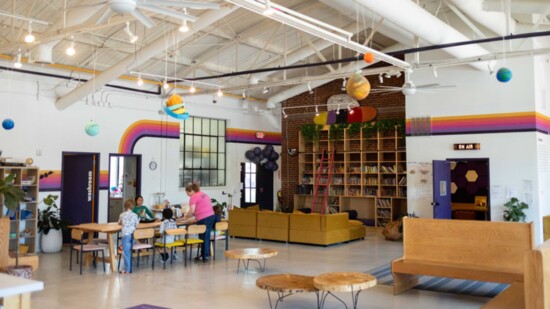That may not have been precisely what Moonrise founder Chris Turner envisioned when he opened the doors of Moonrise four years ago, but it has been a direct result of the brightly-colored world he has created.
Born from a simple yet revolutionary idea, the innovative co-learning space offers the perfect environment where children can learn, play, and grow outside the constraints of traditional curriculum. It's a haven that values freedom, creativity, and holistic well-being while providing a refreshing alternative for families seeking more from their children's education.
The seeds of Moonrise were planted by Turner, who was disillusioned with educational options while searching for a school for his young child. "I toured some of the best schools in the area, but they all followed these outdated models," he recalls. "I was working in beautiful coffee shops and co-working spaces and thought, why can't we create something like this for kids?"
The realization led to the birth of Moonrise.
Its initial concept was simple: provide a flexible, engaging space where children can learn and play. What started as occasional drop-ins for children during the summer quickly became a thriving hub for homeschoolers and their families seeking something different.
"We're not just another alternative school," emphasizes Turner. "We're offering everything but the curriculum. Much of the homeschool curriculum is moving online, but the in-person experiences and spaces are what we are bringing back."
One of Moonrise's core principles is the belief that education is about pursuing interests and curiosity. This philosophy is reflected in every aspect of Moonrise's design and programming. Children are given the autonomy to explore new topics and skills, whether they play instruments, engage in 3D printing, or participate in theater productions.
At its heart, Moonrise operates on a philosophy of freedom and creativity. "We focus on not thwarting creativity," Turner explains. “If you look at the scope of the human experiment, what makes humans unique is that we don't just take what's given to us.
"We build new things in the world. You need to empower creativity to enable human progress and make all the things we take for granted. We don't yet know how to create creativity, but we do know how not to stop it."
And how exactly do they accomplish such a paradigm shift?
"We provide the tools and the space for kids to experiment and learn on their own terms."
The approach has proven truly transformative, especially for kids who struggle in traditional educational settings.
One of the most significant challenges Moonrise faces is changing the mindset of traditional education. Schools have long been structured around standardized testing and uniformity, often stifling creativity and individuality. Moonrise, on the other hand, embraces the diversity of its students' interests and learning styles. "The traditional model worked for a long time, but the world has changed. Jobs are more flexible and creative, and our education system needs to reflect that."
Socialization is a critical component of Moonrise's approach. While "traditional" schools may provide a consistent place for children to see their friends, Moonrise offers a broader social experience. Children of different ages interact, learn from each other, and participate in meaningful relationship-building opportunities. This diversity mirrors real-world social settings and prepares children for life beyond the classroom.
Turner recalls a success story of a child who was initially anxious about the new environment, but within minutes, the staff's warm welcome and the inviting atmosphere eased her fears. By the end of the day, her parents decided to withdraw her from her school and enroll her in Moonrise full-time.
The space is designed with meticulous attention to detail, ensuring it is welcoming and stimulating for children. From the moment they walk in, children, also known as "risers," are treated with respect and given the liberty to do things on their own accord.
Another significant part of Moonrise's success is its constant adaptability. The leadership team continuously engages with parents and children to understand their needs and evolve the offerings. For example, they are now planning out diverse programming like cooking clubs and one-on-one guitar lessons, transforming the space into more than just a drop-off point—it's a vibrant community.
While it has changed to serve its central core of patrons, Moonrise is for more than just homeschoolers. It wants to serve all kinds of families, offering a space where they can be creative and independent, complementing the schooling model of their choice. "We want to make Moonrise accessible for everyone," Turner urges. "Every child can benefit from the experiences and community we offer here."
The vision for the future of the business extends beyond its current location. Turner envisions a network of Moonrise spaces interconnected by shared values and digital infrastructure. These spaces will not only provide a unique learning experience for children but will also serve as a platform for parents and educators to exchange ideas and resources. The potential is enormous, and the need is obvious. Parents and educators worldwide are searching for better ways to educate children, and Moonrise's vision offers a glimpse into the future of learning.
"We're building the real world for kids, a place where they can truly be themselves and grow into their fullest potential."
Moonrise is not just a co-learning space; it's a movement.
Its growth is a testament to the power of innovation and the unwavering belief that every child deserves the freedom to explore, create, and grow. As Moonrise continues to evolve and expand, it looks to redefine how we value education, one community at a time.
“I was working in beautiful coffee shops and co-working spaces and thought, why can't we create something like this for kids?”
“You need to empower creativity to enable human progress and make all the things we take for granted.”
